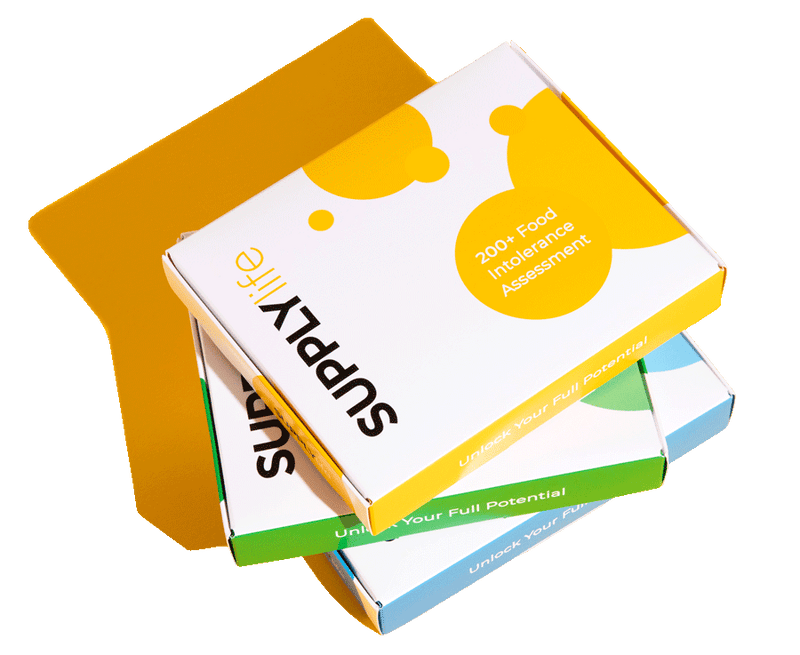What Really Causes Bloating and How to Find Relief
Written by:
 Riya Lakhani-Kanji, MSc, ANutr. Last Reviewed 6th January 2026.
Riya Lakhani-Kanji, MSc, ANutr. Last Reviewed 6th January 2026.
We’ve all had that moment when our favourite jeans suddenly feel uncomfortably snug, even though we definitely didn’t overdo it at lunch. Bloating has a way of sneaking up on us. In fact, many people experience it at some point, with around 40% of individuals in the UK having faced this uncomfortable issue. While bloating can be frustrating and disheartening, understanding its causes and ways to tackle it can help you get back to feeling your best.
In this article, we’ll delve into the causes of bloating and explore how food intolerances might be contributing to it. Plus, we’ve got some practical tips to help you identify your triggers and manage bloating effectively, so you can savour your meals without the uncomfortable aftermath.

What Is Bloating?
Bloating is that uncomfortable feeling when your stomach feels full and tight, often due to an excess of gas trapped in your belly. Your stomach may appear bigger, and it might even feel like it’s stretching too much, almost as if it could burst. Symptoms of bloating can range from a mild annoyance to severe abdominal cramping. You might notice an increase in stomach rumbles, burping, belching, or the need to pass gas, as your body tries to relieve the buildup.
Sometimes, bloating can be confused with other causes of a swollen stomach. Weakened abdominal muscles, common after pregnancy or with age, can create a similar appearance. Knowing the difference can help you tackle the real culprit.
And you’re not alone in this. Research shows that nearly 20% of people globally experience bloating at least once a week, with women twice as likely to deal with it as men. Younger adults also appear more susceptible to bloating than older individuals.

Common Causes of Bloating
Bloating can come from a variety of factors, and understanding what might be causing it can help you feel more in control. Here are some reasons you might experience bloating:
Overeating
One of the leading causes of bloating is simply eating too much in one sitting. When you indulge in large portions, your digestive system can become overwhelmed. This overconsumption stretches the stomach, often resulting in that uncomfortable feeling of fullness.
Swallowing Air
You might be surprised to learn that swallowing air can significantly contribute to bloating. Drinking carbonated drinks or chewing gum can introduce extra air into your digestive tract, leading to increased gas and discomfort.

Constipation
Constipation is another frequent cause of bloating. When waste builds up in your intestines, it can create a feeling of pressure and fullness in your belly. To help prevent constipation, focus on getting enough fibre in your diet by consuming fruits, vegetables, whole grains, and legumes. Staying well-hydrated is also important, as it promotes healthy digestion and regular bowel movements.
Hormonal Changes
For many women, hormonal fluctuations (particularly during the menstrual cycle) can lead to temporary bloating. These hormonal changes can affect how your body retains water and handles digestion, resulting in a heavy, bloated sensation. Being aware of these fluctuations can help you anticipate when bloating might occur and allow you to plan accordingly to manage your symptoms.
Gut Dysbiosis
Gut dysbiosis refers to an imbalance of good and bad bacteria in your gut, and it’s a factor that is often overlooked when it comes to bloating. When this balance is disrupted, it can lead to digestive issues and bloating. To support a healthy gut, consider adding probiotics and prebiotics to your diet. Probiotics are beneficial bacteria found in foods like yoghurt and fermented products, while prebiotics are fibrous foods that feed these good bacteria. Both can help restore balance in your gut and ease bloating symptoms.
FODMAPs
FODMAPs(fermentable oligosaccharides, disaccharides, monosaccharides, and polyols) are short-chain carbohydrates found in foods like wheat, garlic, onions, and many other vegetables and fruits. For some people, especially those with digestive issues like Irritable Bowel Syndrome (IBS), high-FODMAP foods can ferment in the gut, producing gas that leads to bloating and discomfort. So, if you’re experiencing bloating after eating certain foods, FODMAPs might be part of the problem!

The Connection Between Food Intolerance and Bloating
Bloating can often be linked to food intolerances. If your body has trouble digesting certain foods, it can create more gas, retain water, and lead to that dreaded bloated belly feeling.
Food intolerances occur when your digestive system can't fully break down specific substances in your diet. Unlike allergies, which involve the immune system and can cause severe reactions, intolerances usually lead to digestive distress.
Consider lactose intolerance, one of the most common forms. It occurs due to a lactase deficiency, the enzyme needed to digest lactose from dairy. Without enough lactase, lactose ferments in the gut, causing gas and bloating. Similarly, fructose intolerance and non-celiac gluten sensitivity also lead to gas and bloating. Fructose, naturally present in fruits, vegetables, and honey, can ferment in the colon if not absorbed efficiently, producing similar discomfort. Gluten, a protein in wheat, barley, and rye, may cause inflammation and bloating in people who are sensitive but don't have celiac disease.
Additionally, foods high in FODMAPs can be challenging for some people. When these carbohydrates ferment in the gut, they can cause excessive gas and unpleasant bloating. By pinpointing and managing food intolerances through techniques like an elimination diet or professional advice, you can reduce bloating and greatly enhance your well-being.
Still unsure if your food choices are contributing to your bloating? Consider exploring Supply Life's food intolerance testing. We can help identify specific intolerances and connect you with nutrition experts. Join the 94% of individuals who have found relief and take steps towards enhancing your digestive health!
How to Diagnose Bloating
Diagnosing the cause of bloating can be straightforward, but it often requires a bit of investigation to get to the bottom of it. Here’s what you can try:
Keep a Food Diary
Start by keeping a food diary. This means writing down everything you eat and drink, along with notes on when you feel bloated or uncomfortable. Look for patterns; are there certain foods that consistently trigger your bloating? Common offenders include dairy products, high-fibre foods, and items containing gluten or FODMAPs. This diary will provide valuable insights for you and your healthcare provider in identifying potential triggers.
Track Your Symptoms
When it comes to diagnosing bloating, it's important to review your symptoms thoroughly. Bloating can manifest in various ways, so as you keep track of your experiences, think about how frequently you feel bloated and whether it usually occurs after meals or at other times. Try to also pay attention to any other symptoms you might experience, such as gas, cramping, diarrhoea, or constipation. By noting these details and when they arise, you’ll provide your healthcare provider with valuable information that can help them better understand the possible causes of your bloating during your chat.

Try an Elimination Diet
If you suspect that a food intolerance may be contributing to your bloating, trying an elimination diet could be helpful. This involves removing specific foods from your diet for a period of about 4 to 6 weeks to see if your symptoms improve. During this time, it's important to monitor how you feel and pay attention to any changes in your bloating or digestive comfort. After the elimination phase, you can gradually reintroduce these foods one at a time, allowing you to identify which ones may be triggering your symptoms.
Chat With a Healthcare Professional
If bloating persists or is severe, it's important to talk to a healthcare professional. This could be your primary care doctor, a gastroenterologist, or a registered dietitian. They will review your medical history, food diary, and symptoms to help determine the root cause. Throughout this process, maintain open communication with them. Share any new symptoms or changes in your condition, as this information can help pinpoint the cause.
While bloating is usually harmless and manageable, it’s important to watch for certain warning signs that might require medical attention. If you have severe bloating that lasts a long time or if you notice sudden changes in your abdominal pain, it could be a sign of a more serious issue.
You should seek medical help if you experience persistent bloating along with other concerning symptoms, such as unexplained weight loss, blood in your stool, or extreme fatigue. These signs could indicate a problem that needs to be looked into right away.

Bloating can be uncomfortable and annoying, but there are many ways to help ease the discomfort. One effective approach is to look at your diet. Sometimes, certain foods can trigger bloating. Foods like dairy, gluten, or specific carbohydrates can cause problems for some people. Taking a food intolerance test can help you identify these triggers, allowing you to make necessary changes to your diet for relief.
Another effective strategy is to practice mindful eating. This means paying attention to what you eat and how you eat it. Take your time to chew thoroughly and enjoy your food. Eating smaller meals more frequently throughout the day instead of large ones can also help beat the bloat.
Keeping track of what you eat can be beneficial as well. A food diary can help you identify any foods that might be causing bloating. Write down everything you eat and any symptoms you experience. Over time, you may discover patterns and pinpoint specific foods to avoid, such as beans, onions, carbonated drinks, and certain sugars.
Incorporating probiotics and prebiotics into your diet can also be useful. Probiotics are good bacteria that help your gut, while prebiotics are the foods that feed those bacteria. Foods like yogurt, kefir, and sauerkraut offer probiotics, while fruits like bananas and vegetables like garlic provide prebiotics. Together, they can help keep your digestive system balanced and may reduce bloating.
Lifestyle factors are just as important in managing bloating. Stress can significantly affect digestion, so finding ways to manage stress is crucial. Activities like meditation, yoga, or simply taking time to relax can help lower stress levels and improve digestive health.
Regular physical activity is another important aspect of managing bloating. Gentle exercises like walking, stretching, or yoga can help with digestion and reduce bloating. Try to aim for at least 30 minutes of moderate exercise most days of the week to keep your digestive system in good form. And, if you’re short on time, even a 10-15 minute walk can help relieve abdominal bloating, according to this study.

Conclusion
Understanding the causes of bloating is a powerful step in taking control of your digestive health. By recognising what triggers your discomfort, whether it’s certain foods or eating habits, you can make choices that lead to long-term relief. Embracing practices like mindful eating can transform how you experience meals, allowing you to enjoy food without worry or discomfort.
"Bloating can be more than just an uncomfortable feeling; it’s your body’s signal that something is off balance. As a nutritionist, I’ve seen how various factors such as food sensitivities, gut imbalances, and stress can transform a nutritious meal into a bloating nightmare. But the good news is that relief is absolutely possible. Small, consistent changes, like mindful eating, stress management, and eating foods that work with your body, can all help reduce bloating."
— Riya Lakhani-Kanji BSc, MSc
Remember, each person’s digestive response is unique. What may cause bloating for one individual might not do so for another. That's why personalised nutrition matters so much. A food intolerance test, like those we offer here at Supply Life, can be a great first step to understanding what works best for your body. Then, working with a qualified nutritionist can help you fine-tune your approach, uncovering the foods that align best with your own digestive needs.

Written by: Riya Lakhani-Kanji, MSc, ANutr
Riya is a certified nutritionist with a passion for plant-based nutrition. Holding both a bachelor's and a master’s degree in nutrition, she skillfully blends her expertise with her writing to create insightful and engaging content focused on health and wellness.


